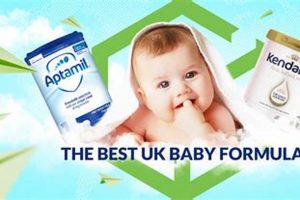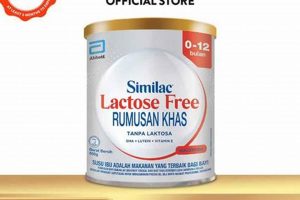
Infant nutrition products manufactured in the United Kingdom adhere to stringent regulatory standards, emphasizing high-quality ingredients and nutritional completeness. These products are designed to meet the specific dietary needs of infants from... Read more »

A homemade infant feeding option, often based on recipes derived from the work of Sally Fallon Morell, involves specific ingredients designed to mimic the nutritional profile of breast milk. The intent is... Read more »

Products designed for infants experiencing digestive discomfort due to formula intolerance frequently utilize specialized formulations. These modified formulas often contain partially or extensively hydrolyzed proteins, breaking down complex proteins into smaller, more... Read more »
![Best European Baby Formula vs American Options? [Guide] Baby Care 101: Essential Tips for Happy, Healthy Babies Best European Baby Formula vs American Options? [Guide] | Baby Care 101: Essential Tips for Happy, Healthy Babies](https://singlebabies.com/wp-content/uploads/2025/12/th-787-300x200.jpg)
A comparison between infant nutrition products manufactured in Europe and those in the United States reveals differences in ingredients, processing standards, and regulatory oversight. These variations can lead to distinct nutritional profiles... Read more »

The inquiry centers on the duration of commercially produced infant nourishment. This concerns the period since human milk substitutes were first developed and made available for widespread consumption as a viable alternative... Read more »

Infant nutrition products designed without lactose are specialized formulas intended for babies who experience difficulty digesting lactose, a sugar naturally found in milk. These formulas typically utilize alternative carbohydrate sources such as... Read more »

Infant feeding options beyond commercially produced substitutes exist. These encompass a range of methods and substances utilized when breastfeeding is not possible or sufficient. For example, donor human milk or homemade recipes... Read more »

This specialized nutrition is designed for infants typically six months and older, complementing the introduction of solid foods. It is a subsequent formula that follows initial infant feeding, formulated to meet the... Read more »

Specialized infant nutrition products designed for ease of digestion are available to address common digestive discomforts in babies. These formulations often contain partially hydrolyzed proteins or reduced lactose levels. An example of... Read more »

Certain types of infant feeding products qualify as eligible expenses under Flexible Spending Accounts (FSAs). This eligibility allows individuals with FSAs to use pre-tax dollars to purchase these items, effectively reducing the... Read more »


